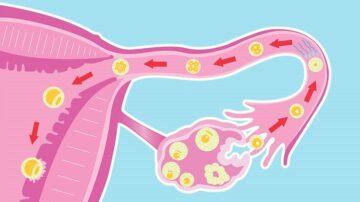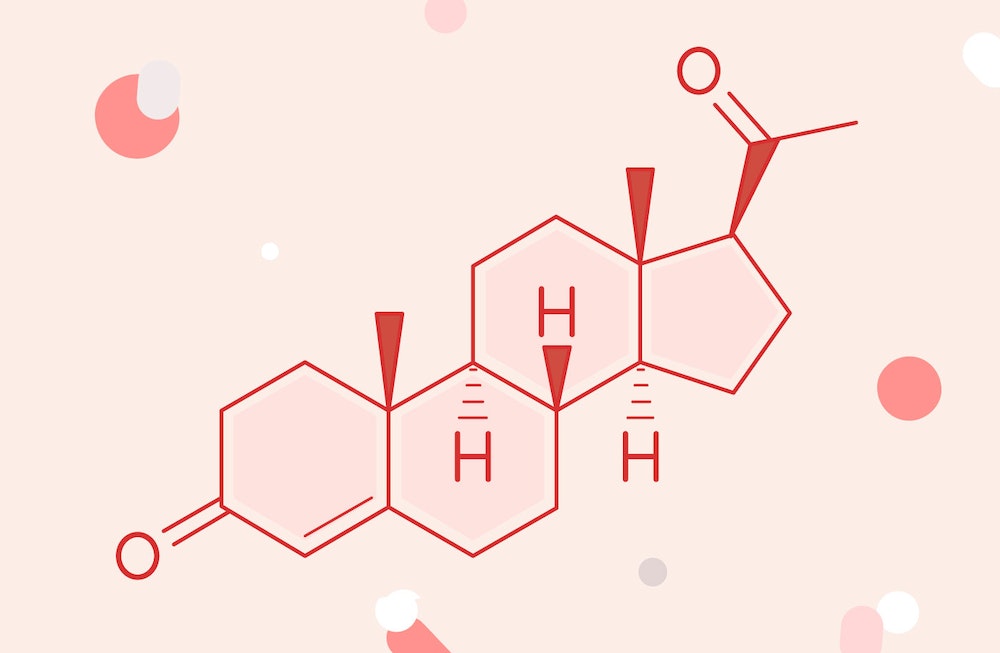IMPROVE PROGESTERONE LEVELS NATURALLY
Progesterone is an essential hormone for women’s health & fertility! This important hormone can end up being a key player in the fertility journey. If you struggle with irregular cycles, long cycles, spotting or recurrent miscarriages, keep reading because these all have one thing in common, they can be caused by low progesterone.

WHAT IS PROGESTERONE?
Progesterone is an important sex hormone involved in the regulation of normal female reproduction. In particular, progesterone plays a role in maintaining, facilitating, and preparing the body for pregnancy, and also ensuring monthly menstruation.
The corpus luteum is responsible for the secretion of progesterone in the second half of menstrual cycle after ovulation. The release of this hormone causes the endometrial lining (lining of the uterine cavity) to thicken, allowing the egg to stick. If implantation of a fertilized egg is to occur, progesterone prepares the body for pregnancy by creating a nourishing environment by stimulating the growth of blood vessels which provide nutrients for the embryo. Progesterone levels will remain consistently elevated during pregnancy.
During the early stages of pregnancy, progesterone has a critical role in the development of the placenta. Once the placenta is established, at around 8 to 12 weeks, it will then take over the release of progesterone from the corpus luteum. Progesterone has roles in the development of the fetus,
maternal breast tissue, prevention of lactation and preparing the pelvis walls for labour.
If implantation of the egg does not occur, the corpus luteum will break down and progesterone will decline, resulting in the beginning your new period.

SIGNS OF LOW PROGESTERONE
When you do not ovulate, or only produce small amounts of progesterone after ovulation, you might have some of he following symptoms:
- Irregular or absent periods
- Abnormal bleeding or spotting
- Recurrent miscarriages
- Decreased sex drive
- Hot Flashes
- Weight gain
- Migraines or headaches
- Mood changes
- Depression
WHAT CAUSES LOW PROGESTERONE?
Low progesterone due to absence of ovulation or irregular ovulation is one of the most common reasons for low progesterone levels & this is why low progesterone can be common in conditions such as Polycystic Ovary Syndrome (PCOS). There can be a number of reasons why your progesterone levels might be low so it’s always important to see a medical doctor for full investigations.

HOW TO INCREASE PROGESTERONE NATURALLY
- Decrease Stress– Stress significantly impacts progesterone levels. When the body is in ‘fight or flight’ mode due to stress, cortisol production is increased in the adrenal glands. The problem is that in order to make cortisol, progesterone is needed. Since progesterone is now being used to make stress hormones, and not what it is designed to do, an imbalance is created.
- Achieve a healthy weight- Either not having enough body fat or a having a body fat percentage that is too high can impact on ovulation & your bodies ability to produce progesterone naturally. Having a higher body weight makes you three times more likely to struggle with irregular periods. If you’re weight is either too low or higher than ideal, it might be worth speaking with one of our fertility dietitians about how you can optimize your weight in a healthy, sustainable way that will enhance your fertility. If you need help & support with this, you can book an online consultation.
- Vitamin E- There’s not a lot of research regarding Vitamin E status and reproductive health but there are a few research studies undertaken in Turkey that have found that vitamin E supplementation of 500 international units per day in women with unexplained infertility, improve their endometrial thickness in their IUI cycles. Vitamin E may improve the endometrial environment by its antioxidant effect.
- Focus on Vitamin C
Vitamin C has a number of important roles in the body including supporting immune function, wound healing & skin health. Vitamin C is also a powerful antioxidant & emerging research shows that Vitamin C intake is linked with higher progesterone levels. An interesting study found that 750 milligrams of vitamin C per day almost doubled progesterone levels, and more than doubled rates of pregnancy compared to the control group. Foods rich in Vitamin C include citrus, berries, kiwi fruit, papaya, capsicum, brussel sprouts broccoli & cauliflower. - Focus on Vitamin B6
Vitamin B6 is a vitamin involved in making cells and hormones, including progesterone. One study found that taking vitamin B6 supplements helped to increase progesterone levels. Foods that are rich in Vitamin B6 include peanuts, pork, chicken, bananas & oats. - Selenium– Animal studies suggest that increasing selenium intake may help to boost progesterone. Brazil nuts are a really rich source of selenium with the average brazil nut containing around 96 micrograms of selenium, which is more than double the daily requirements.
- Focus on Omega-3 Intake– An interesting study found that when animals were fed higher intakes of flaxseeds, their progesterone levels increased.
- Focus on Vitamin D Intake– Needed for the production of progesterone. A really interesting study showed when milk is derived from pregnant cows that naturally contain small amounts of progesterone just as breast milk does, that the higher the percentage of fat the more progesterone it is going to contain. One small study found that giving people high fat dairy products boosted their progesterone levels by 30%.
Nutrition & lifestyle strategies that can help support you ovulate regularly & have a regular period include:
Choosing good quality, low GI carbohydrates
Reducing your glycemic load & eating the right amount of carbohydrates for your individual needs
Including more plant based proteins in your diet
Increasing your intake of foods rich in omega 3 fats & reducing your intake of foods high in saturated & trans fats
Eating enough calories for your individual needs & avoiding restrictive diets
Reviewing & reducing your alcohol intake
Optimizing your iron levels
Reducing stress
Prioritizing adequate sleep
If you are looking for support with progesterone production through nutrition, schedule a 1:1 consultation where we can discuss in detail, key foods to include to boost progesterone levels for fertility
Get in touch today for more information.

Looking for a dietitian to help boost your progesterone status and learn more about the role of food in your fertility journey?



